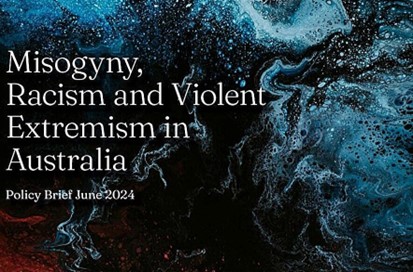We’re All Terrorists Now – Janice Fiamengo
Make no mistake: our governments want to outlaw dissent from feminism
|
|
|||||||||||||||||
|
||||||||||||||||||
 |
||||||||||||||||||
One can sense the beginning of a joke: a radical feminist (barrister Charlotte Proudman), a men’s advocate (Ally Fogg of the Men and Boys Coalition), and a professor who studies the manosphere (cyber threat specialist Joe Whittaker) walk into a BBC studio to discuss the UK government’s announced plan to tackle misogyny. The joke is that no real debate occurs, despite Fogg’s contention that boys and men are as much victims as victimizers. Overall, the three agree that extreme misogyny is a “serious” “pervasive” problem, that it is prevalent throughout online men’s discussions (in the so-called “manosphere”), and that boys and men must be educated out of any tendency to direct anger at women or feminism.
Inch by feminist ich, what was once a convenient exaggeration (that criticism of feminism and non-feminist men’s discussion are misogynistic) has become the only allowable view.
**
No one who has been paying attention should be surprised. According to a report in The Telegraph, the UK’s revamped counter-terror strategy will likely address “extreme misogyny” as one of a number of “emerging ideologies” that “promote violence” and “undermine democracy.” The strategy will make it mandatory for teachers to refer pupils suspected of such misogyny to counter-terror officials; and will draw an equivalence between recruiters for Islamist bombings and influencers such as Andrew Tate. While details are as yet vague, the purpose seems undeniable: to (further) politicize any and all violence against women as an expression of woman-hating (an idea already embedded in terminology such as femicide and gender-based violence), and to stigmatize critics of feminism as potential threats to national security.
There is no reason to believe the UK plan will differ from efforts in other parts of the English-speaking world to link anti-feminism to political violence. Canadian legislation already defines incel violence as a form of terrorism; and Canadian authorities have prosecuted a knife attack at a massage parlor under the new law. A recent report by academics at the University of Melbourne alleges that “misogynistic beliefs” are a “significant predictor of most forms of violent extremism.” The US Prevention Practitioners Network provides a detailed outline of the alleged relationship between political violence and manosphere internet content.
 |
Notable in all these initiatives is a revised definition of terrorism. Terrorism was once understood as the use of violence to achieve a political end through tactics of intimidation, and a terrorist was someone who advocated, supported, and carried out such violence. Now officials speak of violent extremism rather than terrorism, and shift the emphasis from extremist violence to extremism. According to this definition, an extremist may be someone who argues that men should avoid marriage; or believes there are significant differences between men and women. An anguished, bullied loner like Marc Lépine is transformed under this view into an aggrieved revolutionary with a political agenda. Even a twelve-year-old boy who asks his teacher “What color is your Bugatti” (an Andrew Tate meme), laughs with mates at a school video on same-sex relationships, or has prepared answers (now called “hate scripts”) for his teacher’s feminism is seen as at risk for “radicalization.”
If the above sounds paranoid, one need only read the documents in question. The US Prevention Practitioners Network, which defines itself as “an interdisciplinary network of professionals working on the prevention of targeted violence and terrorism in the US,” alleges without any exceptions or qualification that manosphere content is misogynistic; and it makes sweeping, false generalizations about men’s advocacy:
The ‘manosphere’ is dangerous because it is founded in anti-women hate. Individuals and networks in the ‘manosphere’ express conspiratorial and often violent beliefs about women, where a woman’s only value is her ability to procreate or to fulfil the sexual needs and desires of men, where women are referred to as subhuman sexual objects, and where feminism is seen as an enemy of mankind, among others.
Note how an objectively reprehensible belief (that women are subhuman—though no evidence is provided that such a belief is widespread or even generally acceptable in the manosphere) is linked to a belief not at all objectively reprehensible (that feminism is “an enemy of mankind”—which is quite possible to believe while loving women). The report emphasizes the tiny number of self-declared incels who have been responsible for acts of mass violence, but neglects to put the number in context or to mention the overwhelming majority of manosphere content creators whose positions are entirely non-violent. No mention is made of issues discussed in the manosphere such as male suicide, paternity fraud, loneliness and self-hatred, false rape allegations, or corrupt family courts. No attempt is made to distinguish violent misogyny, where it may exist, from good-faith argument, self-help advice, scientific research, satire, and therapeutic venting.
 |
The Prevention Practitioners report would be laugh-out-loud funny if its implications for policing and counter-terrorism were not so alarming. Various researchers and advisors have obviously combed through dozens of manosphere sites, learning nothing and forgetting nothing. The report provides tone-deaf explanations of such manosphere concepts as currycels and gymcels, Beckys and Chads, hypergamy and monkey-branching, red pills and blue, the 4 Stages of MGTOW, and on and on; it’s as if a group of dull, unimaginative anthropologists spent a couple of intense weeks observing a savage foreign tribe for whom they had already conceived a deep disdain.
Not a single point made by any manosphere analyst is admitted to be true. Not a single overlap is noted between red-pill insights and mainstream commentary: for example, on the loss of presumption of innocence, the fentanyl crisis, fatherlessness, mass immigration, women’s self-reported unhappiness, or the widening gender gap at college. All the keen observation, humor, irony, brotherly support, despair, bombast, and ingenious analysis are registered without empathy or comprehension. It doesn’t matter how many red pill commentators go out of their way to stress their good will: they are all, according to this account, hate-filled.
Roosh V’s thought experiment about making rape legal on private property (in which case, he hypothesized, women might take greater responsibility for their sexual safety) is trotted out as if it were a straightforward proposition (you can’t read it for yourself because it has been removed from the internet, as these practitioners think most manosphere content should be). Furthermore, the rampant misandry to which much manosphere content responds—misandry not found in far corners of the internet but disseminated by respected feminist thought leaders, which I have extensively documented (for example, in my video series on feminist history and in articles here, here, here, and here)—is never mentioned.
Academics have been purveying such vilification for years. In 2017, University of Calgary English Professor Rebecca Sullivan caused hilarity in manosphere circles when she declared in an interview with the Canadian state-funded broadcaster that the message of men’s rights advocates in Cassie Jaye’s “The Red Pill” (and the reason why the documentary was so “scary,” though Sullivan hadn’t bothered to watch it) was “If only we could have sex with whoever and whatever we want whenever we want, then maybe we wouldn’t have to rape you” (after which she and the interviewer sniggered companionably). Only a loopy left-wing English prof, it was then agreed, could come up with such an ill-informed response to red pill discourse. Now we find the same inaccurate message in the materials given to counter-terrorism researchers, as for example in the Prevention Practitioners Network claim that Pickup Artists “feel men are owed sex and that women therefore need to be sexually available at all times.”
 |
Feminists academics have long been at the forefront of the move to criminalize anti-feminist dissent. A recent survey-based report by University of Melbourne academics Sara Meger, Melissa Johnston, and Yoland Riveros-Morales emphasizes a growing “backlash against gender equality” [sic] that is allegedly driving support for violence. Here, rather than examining views in the manosphere, the academics surveyed general attitudes amongst a sample of Australians.
Not dissimilar to the American report on manosphere content, the University of Melbourne report uses a broad brush to define misogyny, including many beliefs that until recently (or even today) would be considered simple common sense. They present the following as examples of misogyny:
50% of male respondents think women going through custody battles make up or exaggerate claims of domestic violence. 49% of male respondents agreed that women often make up sexual assault accusations. 31% of respondents agreed that a woman who doesn’t leave an abusive partner is partly responsible for ongoing abuse. 27% of respondents agreed that sometimes a woman makes a man so angry that he hits her when he didn’t mean to.
Anything less than a near-worshipful faith in the unvarying purity of female nature, it seems, is here classed as misogyny. What kind of extremists, one must ask, formulated such statements as evidence of woman-hatred? The possibility that many of the male respondents have come to their views honestly and accurately through multiple interactions with and observations of girls and women is, of course, not considered. What is a man to say if he has been on the receiving end of women’s malicious lies, accusations, and verbal and physical abuse? What is he to believe if he has seen family members and close friends disgraced, ruined, and forced into suicidal despair by women’s predatory greed and retaliatory calumnies? The basis for the views expressed by portions of the Australian public is not, of course, of any interest to the three academics.
One of the most significant of the survey findings, and the one the authors found most alarming, was a statement of support for anti-feminist resistance. 19.4% of male respondents agreed that “Feminism is damaging to our society and should be resisted by force if necessary.” The academics evidently expect readers to be as aghast as they are. But without some discussion of what exactly the respondents meant by “force” and, especially, by “if necessary,” the statement is effectively meaningless. Did the respondents believe that it was desirable to take violent action in the immediate present, or were they looking forward to a future in which feminist trends, including bias in the legal system and restrictions on free speech, had worsened? Were they themselves willing to take up arms or commit violence—and what sort of violence did they have in mind?—or were they interpreting “force” more broadly to include aggressive activism, civil disobedience, or government legislation backed by police powers? Without specifics such as these, the statement tells us next to nothing about the type of threat identified.
Covered over in all of these discussions is not only the legitimacy of anti-feminist concerns but also the simple fact that feminism itself is both extremist and violent. All forms of feminism, even the most reputedly moderate, call for the partial or complete denial of the biological basis of sex differences, the overturning of centuries-old patterns of male-female social and familial cooperation, and the forced integration of women and feminist policies into government, businesses, academia, news reporting, law, medicine, and science. All forms of feminism encourage ideas of female moral superiority and male predation, while downplaying or denying female predation and the male role in civilization. All forms of feminism demand access for women to formerly male domains and privileges while insisting that special protections and exemptions for women (from being drafted in war, for example) must continue. No successful civilization has ever before conducted such a social experiment, and it is perfectly reasonable for citizens to analyze and object to it.
Feminism is violent because it has the power of the state behind it. Though female violence is also real, feminist violence is far more prevalent and dangerous. What else should it be called but violence when police officers appear at a man’s door to force him into a psychiatric examination because of a vengeful or hysterical spouse’s unproven allegations? What else is it when a man is imprisoned for any term by a woman’s evidence-free claim of sexual or domestic assault? What else is it when a man is denied the right to parent his own children—even the right to see them, hug them, wish them happy birthday, or speak with them on the phone–on penalty of imprisonment, but is still forced to pay for their maintenance?
The above are a few of the intolerable fruits of feminist legislation and policy-making. They represent far-reaching assaults on the most fundamental civil rights of men, all enforceable by the feminist state. Not all women or feminists want this outcome, of course, but any woman or feminist can pursue it if she wishes, and few feminists are working to undo what their sisters have put in place. How would it not be a fundamental error or type of willed ignorance for any man to ignore this reality? How would it not be a fundamental dereliction of a man’s duty as the upholder of civilizational sanity not to seek to oppose it, by force if necessary? I suspect that more than 19.4% of Australian men secretly hold this allegedly terroristic belief.
The move to define criticism of feminism as a form of violent extremism is merely the latest example of the inherent tyranny of feminist ideology and practice. Such tyranny will not rest until every dissident boy or man is demoralized, silenced, imprisoned, or dead. Left to its own devices, feminism will ultimately destroy every vestige of the freedoms and rule of law passed down by our forefathers. Few of us want violence; but we are fools not to admit that violence is already here, and will worsen over the next decades as feminists work to outlaw resistance to their power.
|
|||||||||||
© 2024 Janice Fiamengo
Unsubscribe